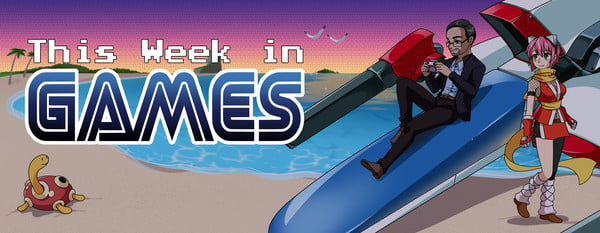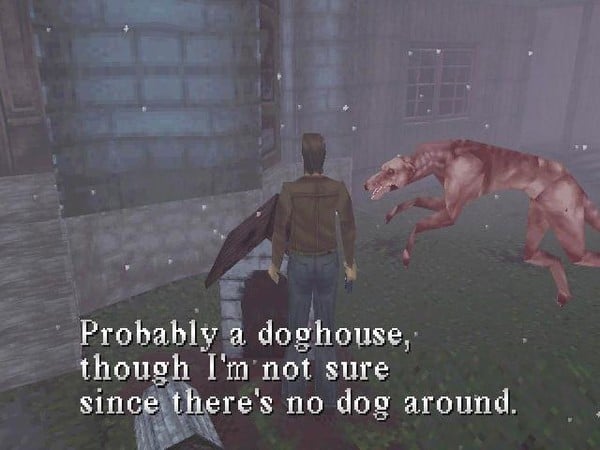This Week in Games
EA Games Gets Played
by Jean-Karlo Lemus,
Welcome back, folks! I finally got to share my Digimon Story: Time Stranger review this week. It was definitely one of the most fun things I've worked on all year. I hope people enjoy the game for what it is. I sadly missed the boat on Cyber Sleuth back when that released; I still have it in my backlog. I'm hoping Time Stranger's success leads to Bandai Namco possibly re-releasing the older Digimon World games. They're wildly inconsistent even with each other, but that's just part of the charm. Also, the little PS1 sprites are really cute.

Doug Bowser Retires as President of Nintendo of America
Doug Bowser's term as President of Nintendo of America has largely been overshadowed by one thing: the man's last name is "Bowser," and isn't that wacky? Unfortunately, hacks are going to have to find a new joke: Nintendo announced that Doug Bowser has retired from his position.
Today, I announced my plan to retire from Nintendo, effective December 31, 2025. Nintendo has been an integral part of my life for 44 years, starting with Donkey Kong Arcade as a kid in college. It has been an honor to contribute to this incredible company and bring our beloved… pic.twitter.com/nIzCnHjQ9E
— Doug Bowser (@thetruebowser) September 25, 2025
Bowser's retirement is under intense scrutiny from many armchair business analysts. His term as president was only six years, so clearly he did something to anger Nintendo, right? Now that he's gone, Nintendo will go back to The Good Old Days™ (whatever those are), right? Probably not; while it's romantic to think that the man angered someone from the Japanese branch, it's more than likely that Doug just wanted to retire (for reference, he's 60 years old). Many of the things that Nintendo has done that live rent-free in people's heads were likely things that he had no sway over—the Switch 2's pricing, the Pocketpair lawsuit, what have you. Many people dislike him because he wasn't as prominent as Reggie Fils-Aimé, who was frequently present at Nintendo presentations and was easily meme-able, having once acknowledged the "My Body Is Ready" meme.
In the meantime, longtime Nintendo executive Devon Pritchard will replace Bowser as President of Nintendo of America. Pritchard currently holds the title of Vice President of Revenue, Marketing, and Consumer Experience, and has worked with Nintendo since 2006. One claim I saw is that Pritchard is "super-litigious," and I can only say that at no point has Pritchard ever worked for Nintendo's legal offices. About her only participation was making a statement in 2015 regarding a patent lawsuit that was filed against Nintendo over handheld console designs. According to Wikipedia, some of the titles that Pritchard was involved with, marketing-wise, include Pokémon Legends: Arceus and Kirby and the Forgotten Land.
Meanwhile, Satoru Shibata is set to be appointed as Nintendo of America's new CEO. Shibata has a strong fandom courtesy of his tenure as head of Nintendo of Europe, where he was seen singing and dancing to promote 3DS games. He's basically Nintendo of Europe's own Reggie Fils-Aimé. He's worked with Nintendo since 1985.
So, what does this mean for Nintendo? Well, if you're hoping for the Switch 2's price to drop, or for the Pocketpair lawsuit to get dropped, or for Nintendo to put its games on PC: that ain't happening. Nintendo of Japan holds way more power over Nintendo of America than it used to, with NoA effectively serving as a localizing/marketing branch more than anything else. Pritchard and Shibata are definitely passionate about the brand, for what that's worth (Pritchard has a picture on her LinkedIn where she's holding a Bulborb plushie, Shibata is... Shibata). However, I don't think this will lead to any radical changes, especially not in a short timeframe. As always, many of Nintendo's decisions boil down to surveying the state of the industry and the global economy. While there's the story of Reggie convincing Nintendo of Japan to bundle Wii Sports with the Wii, there isn't much room for current NoA presidents to do the same these days.
As with a lot of business news, this isn't good news or bad news—it's just "news." We'll see how this pans out in real-time.
EA Games Acquired in Leveraged Buy-Out
After the Microsoft/Activision-Blizzard acquisition, I made a little promise to myself that I wouldn't cover more of these mergers and acquisitions. The reason is simple: they're too exhausting to cover. The results illustrate the damage these mergers have done time and again. Thousands upon thousands of developers have been laid off, while new owners insist that maybe this time will be different. But it never is. I can only bear to write about so many people hurt so many times. This case is too big to ignore: EA Games has been acquired in a record-breaking $55 billion USD leveraged buy-out.

EA Games requires no introduction; anyone familiar with gaming is likely aware of who they are. They're one of the largest publishers in America, second only to Activision Blizzard. They're responsible for some of the biggest titles, particularly in the field of sports games (Madden NFL, FIFA 2K, so on). Their publication system is like clockwork, fully capitalizing on games that have attained any degree of mainstream popularity, such as Need for Speed or Rock Band. They've infamously been voted as one of the worst companies to work for—twice. They've been known to buy out beloved studios only to plunder their IP and leave the scrap for the buzzards, with countless corpses left in their wake—Origin Systems, Maxis Games, Bullfrog Productions, and BioWare are some of the biggest purchases and losses, to name a few. They're also responsible for shutting down plenty of other studios, like Visceral Games, best known for the beloved Dead Space series. Through their AAA games, EA popularized countless predatory schemes such as lootboxes (which they've tried to whitewash as "surprise mechanics").
The purchasers in this case include a diverse range of individuals; among them are the Saudi Arabian Public Investment Fund and Jared Kushner, the President's son-in-law. (That's how you know the deal is great: politicians stand to profit from it the most.) As a reminder, this is a leveraged buy-out; this means that EA Games effectively owns the interest in its own purchase. Yes, EA Games is footing the bill for its own US$55 billion acquisition. These kinds of acquisitions are the sort of thing that killed Toys 'R Us, Joann's, and Instant Brands (the people who make Pyrex). It's a recipe for success, for sure!
When I look at how badly things went with SNK after they got bought out by Mohammad Bin Salman, or how Microsoft went through with laying off 15,000 employees just this past summer (plenty of them from the Xbox division), I genuinely fear for the industry. These kinds of billion-dollar deals that leave laypeople in the lurch are far more damaging to the industry than expensive handhelds. We've seen this story go down before. Hard not to lose hope in the sight of it all.
Many people view this as a sign of an imminent industry crash. Some of that is catastrophizing. People have gotten a bit accelerationist lately and want to see the industry crash and burn and get things over with, devil take the people in the trenches who have to deal with actually losing their jobs. But this is definitely one of many straws straining the proverbial camel's back. We're talking about scales of money that are simply above what the industry can produce on a quarterly basis. Even if Pokémon grossed US$90 billion, that was over a period of decades with cartoons, films, toys, clothes, and an ongoing successful card game on top of a successful game series. You're looking at companies "too big to fail" making waves at a time when people's spending money is stretched wafer-thin.
There are also plenty of reasons to be concerned about the games themselves. SNK fans learned this the hard way when soccer player Christiano Ronaldo (who, at the time, played with the Saudi Arabian football club) was shoehorned into a cameo appearance in City of the Wolves. Final Fantasy XVI was also banned from sale in Saudi Arabia due to Square Enix refusing to censor out a scene where two men visibly kiss. Goodness knows how this could affect EA going forward.
It's way too soon to sound the funeral bells for EA Games... but honestly, it'd be hilarious if the company ended up experiencing the same ignoble fate as many of its acquisitions after it had acquired itself. "Live by the sword, die by the sword," all that. I wish thousands upon thousands of devs didn't have to worry about their jobs.
Silent Hill f Succeeds, Silent Hill 1 Remake In The Works
I haven't gotten too deep into the discourse on remakes lately, but there's a lot to discuss especially given the news that Bloober Team, hot off their success with the Silent Hill 2 remake, are now working on remaking the original Silent Hill.

The decision was clearly one made after considerable deliberation. Bloober Team took a lot of heat when the team announced they'd remake Silent Hill 2. But it turned out that the Silent Hill 2 remake was actually quite solid. Not revolutionary, by any means, but a clear indicator that Bloober Team was actually quite competent at coloring within the lines, as it were. Thus, the news that they're remaking the first game is somewhat heartening. While not quite as beloved as the series's crown jewel, Silent Hill 2, the original Silent Hill is still a masterclass in survival horror—albeit one that's not quite as well-executed as its sequel. If there's a game that needs a lot of quality-of-life improvements, Silent Hill is it.
But a lot of people are burnt out on game remakes, and one reason that I can relate to is that too many of them seem to be designed to "replace the old game." Now, don't get me wrong: I love accessibility options and quality-of-life stuff. I'm a hardcore believer that the worst damage from Monster Hunter implementing a health bar for monsters would be naysayers ripping their own hair out (CAPCOM, do it, it'll be hilarious). However, I also really love it when things are taken into context.
Take Dragon Quest: a lot of the recent games have done away with the Evac spell, which allows you to escape a dungeon instantly. They've also simplified matters so that the Zoom spell, which teleports you across the world, works indoors (in the past, using Zoom indoors would make your characters crash against the ceiling and fall back down to the ground). Now, I get it; you're cutting down on redundancy by removing an old spell and making Zoom more useful by making it work indoors... but you're missing the point of Evac once you get it. Evac isn't supposed to be a half-ways teleportation spell, it's an option—and one that you use with great deliberation. Going into dungeons is rough, especially since MP is hard to recover in Dragon Quest. So do you splurge on that Kasizz spell against that tough group of monsters, risking having to take the long way back out of a dungeon? Or do you tough it out in the name of a guaranteed escape once you've finished your business? Later in the game, when your mages are rolling in the MP, the decision is moot. But early on, when you just got Evac, you really need to sweat the decision. This isn't a bug, it's a feature.
And so it is with a lot of other games. Many aspects of their design might be compromises made in the name of getting a game to ship on-time or finding some means of getting a feature to even work... but that compromise is part of the experience of the game. It's like colorizing old black-and-white movies: the monochrome wasn't a flaw to be fixed in the future. The makers of the 1950 Cyrano de Bergerac (one of my all-time favorite films) weren't banking on Technicolor being invented in the future to "truly" bring their vision to life. They worked with the limitations of what they had to deliver a fantastical experience that grabs the audience. If I can gush a little: there's a montage in the film where Christian (played by William Prince) is practicing his ability to speak to woo Roxanne (played by Mala Powers). There's a bit where we see him speaking to someone whose back is to the camera, and you think, "Oh wow, he's already sharing poetry with Roxanne!"—but then they turn their head sideways and it's Cyrano (played by famed Puerto Rican actor José Ferrer). I saw that film for the first time in high school—in 2005. It was a subtle trick, but one that I've been obsessed with for twenty years. And it only works in monochrome. (Which is why I'll never entertain the notion of watching Cyrano de Bergerac in color.)

There are numerous examples of this phenomenon in video games. I may actually love Metal Gear Solid: The Twin Snakes, but one note I'll agree with its critics over is that the addition of a first-person aiming mode absolutely ruins several key moments of the game. Along those same lines, I maintain that losing the tinted green fog that's everywhere in Metal Gear Solid: Snake Eater hurts the game far more than its "outdated" graphics ever could. You lose too much atmosphere. Provided, I do see the appeal in fixing a lot of unfinished stuff in older games, like Chrono Trigger finally restoring the Singing Mountain in the DS remake (which also allowed it to better bridge the gap between the game and its sequel, Chrono Cross), or Dragon Quest VIII on 3DS finally allowing Red to join the party. But the fact of the matter is that a remake isn't the original game. And I understand why it might be easier to remake a game (especially considering how many studios struggled to preserve the master code of their older titles). That doesn't mean I'd rather play the original in context.
The bitter pill is that the argument over remakes isn't new. We've been dealing with this since the 8-bit days. Remakes and ports have always been a staple part of any game's library, and for a simple reason: it's a great way to pad out empty months between new releases, and people who enjoyed a game might repurchase it on a newer console, especially if there's new stuff. I can't remember all of the myriad times I've bought Gunstar Heroes, and I will buy it again in the future. Which is part of why I'm otherwise unconcerned with the discourse over remakes; the argument isn't new, and I'm perplexed by people having a bee in their bonnet over it lately. Provided, I agree that this would sting less if older games were way more accessible; I'm still waiting for Phantasy Star 2 to be made available on the Switch somehow.
🎊 SILENT HILL f has sold over 1 million copies worldwide in just 3 days!
— NeoBards Entertainment Ltd. (@NeoBards) September 29, 2025
Thank you to all players who joined this adventure of psychological horror. We hope you've found the beauty in terror in this world set in Japan's Showa era. ⛩️🌫️#SILENTHILLf #Konami #NeoBards #Silenthill https://t.co/4P4kAHydjY pic.twitter.com/SubJ1lI74E
The other side of the coin is that Silent Hill f sold a million copies in a day—needless to say, far more quickly than the Silent Hill 2 remake. Evidently, there's a lot of hunger from the audience for new games and experiences—the obstacle here is that these new games need time and money to be made, and sometimes you might lay an egg. (Doesn't help that people seem to want "new experiences" that aren't too new—I saw how folks reacted to South of Midnight!) But if you build it, they will come. Once again, it's The Economy, Stupid™; it's not exactly easy to make new games or experiences when things are as royally messed up as they are.
The weird thing about the gaming industry being so screwed up is that people still want to make games, and there's still plenty of creativity to be had. But you can't just make a game cheaper, because companies can't afford to look anything less than cutting-edge, and audiences won't accept it either (heck, people practically burned Avowed at the stake because you couldn't steal spoons). As with all things, there is more to the discussion than studios being "lazy" or whatever. However, a good solution would be to show a bit more sympathy to developers: trust me when I say that more developers wish they could make more Silent Hill f games and lack the means to do so. Not everyone can risk mortgaging their house to make their dream game a reality.
Also, if I've impressed anything else upon you all, watch Cyrano de Bergerac. There's your required reading for the week.
Nintendo Takes Stance Against Slavery
Sometimes I worry about coming off as a Nintendo fanboy. Which is weird, because outside of handhelds, I haven't really owned many Nintendo consoles in my life: my first Nintendo home console was the GameCube, and I didn't get a second home console until the Switch—which I bought in 2020. I grew up on a diet of Game Boy and Nintendo DS titles, but when I was at home, it was the PS2 that dominated my life with its cavalcade of Japanese RPGs and quirky titles. Meanwhile, my very first console was a Sega Genesis.
At any rate, here's some more Nintendo news for people: Nintendo has taken a firm stance against slavery. I know, this has intense "My shirt about my hatred of slavery is getting me a lot of questions about slavery that are answered by my shirt"-vibes, but it's right here on their website; Nintendo has illustrated their business model and the efforts they've taken to prevent slavery. Now, when a lot of people think of "slavery," they're likely to think of people in chains working the fields in a massive plantation. And that's valid (the Atlantic Slave Trade and everything associated with it was so much worse than you think). But modern slavery indeed still exists; the United Nations still recognizes human trafficking as a major problem worldwide. And even that isn't relegated to far-off lands; there are still as many as one million victims of human trafficking in the United States alone.
So, what does this look like? How does Nintendo factor in? Well, Nintendo acknowledges that it has a "fabless" production model for its products, which means it doesn't own any of the facilities where its products are manufactured. Via this policy, they're acknowledging the inhumane conditions that might be the result of these industrial systems (for example, slavery in Eastern Congo as a result of mining the cobalt that literally fuels all rechargeable batteries).
Nintendo has underlined their commitment to supporting the United Nations' International Bill of Human Rights and the Guiding Principles on Business and Human Rights, using them as a foundation for their own internal human rights policy. This includes internal policies such as only hiring from reputable agencies, entering written contracts with all employees, and a system employees can utilize to report potential violations; as well as external policies such as ensuring their supply chain and product partners are not involved with human trafficking, slave labor, child labor, forced labor, or prison labor in their practices. That last one is particularly relevant, as the United States has an extensive history of depending on prison labor (for example: inmate firefighters. What this tells me is that someone at Nintendo has boned up on the subject and is making sure they cover all the necessary bases.
This is all pretty good and well, and honestly, I hope other publishers start following suit in establishing similar guidelines and committing to them (Microsoft, I'm looking at you). But if there's something I've learned from watching This Week Tonight, it's that these policies—while well-meaning and certainly a step in the right direction—might not be enough. Take chocolate, for example—gah, now I'm typing in John Oliver's voice—so, like, chocolate, yeah? Famously, Nestlé is quite possibly one of the most evil companies out there at the moment, given their extensive history of actual human rights violations. Among them, of course, is the sourcing of their chocolate; the cocoa beans used to manufacture chocolate are often sourced from locations little better than the aforementioned ones over in Congo. Now, Nestlé has signed agreements to ensure their cocoa is humanely sourced, but this can mean as little as "we send a guy over there every so often to make sure there aren't kids in chains"—which, as you can imagine, is pretty easy to obfuscate.
So, what can we do what does that mean for us? Well, clearly Nintendo has taken the first step: it acknowledges that there are problems with the global industry as it stands, it has established a set of guidelines for itself to ensure that it doesn't fall into these problems, and it has established a commitment to expecting these standards both for itself and its business partners. That's a good foundation! What's needed now is for the audience to follow through and hold conversation with Nintendo regarding this fact; this means reading the news and keeping up with global trends, respectfully requesting updates on how Nintendo's policies are being upheld, and potentially checking in on if these policies are actually helping. I think that if the audience is genuinely concerned about "consumer rights" as they say they are, they can start by making sure the company they're looking at is actually following through on their commitment to their new policy.
Let's wrap up with some quick tidbits
That'll do it for this week, I think. I've talked before about the need for people to actually reach out to their favorite creatives, and I'm reinforcing that this week; this past weekend, an interview with Takashi Tateishi (the composer for Mega Man 2 went live where he stated that nobody had ever told him how much they loved his work on Mega Man 2. That's with Wily Castle 2 having been rearranged by JAM Project. A lot of creatives really don't get to enjoy how much their work affects us or brings us joy, and it's moments like these that really underline how much we need to share our gratitude with these creators. There's never been a better time, especially now with social media. Please reach out to your favorite creators; likely, they're up on Twitter somewhere, and I'm sure you'd be making their day. Be good to each other. I'll see you in seven.
This Week In Games! is written from idyllic Portland by Jean-Karlo Lemus. When not collaborating with Anime News Network, Jean-Karlo can be found playing Japanese RPGs, eating popcorn, watching v-tubers, and tokusatsu. You can keep up with him at @ventcard.bsky.social.
The views and opinions expressed in this article are solely those of the author(s) and do not necessarily represent the views of Anime News Network, its employees, owners, or sponsors.
discuss this in the forum (2 posts) |